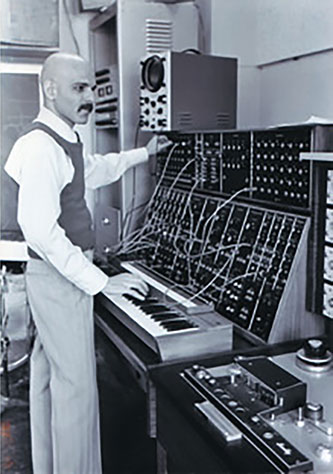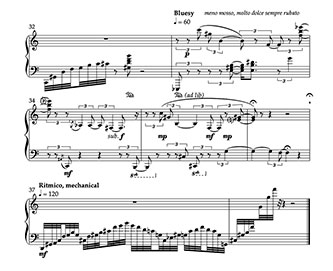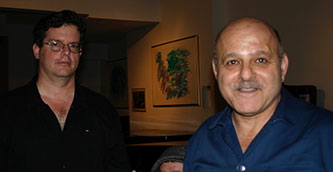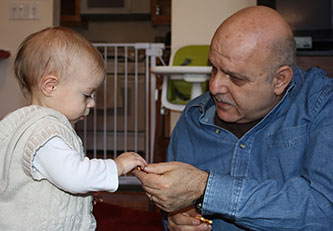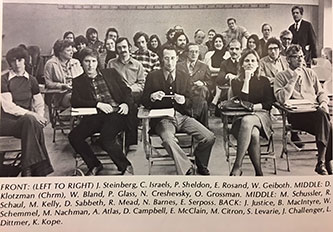American Music Review
Vol. L, Issue 1, Fall 2020
In remembrance of composer, electronic musician, and teacher Noah Creshevsky (1945–2020), we at HISAM are reprinting here some words the Institute first published (pdf) in honor of Creshevsky’s sixtieth birthday in 2005.
***
Noah Creshevsky studied composition with Nadia Boulanger in Paris and Luciano Berio at The Juilliard School. As a faculty member in Brooklyn College’s Conservatory of Music, he coordinated the composition program and directed the Center for Computer Music. Creshevsky’s recent compositional work is part of a genre known as hyperrealism, explored in an essay published in HISAM’s fall 2005 (pdf) Institute for Studies in American Music Newsletter. In honor of Creshevsky’s birthday, an excerpt from Tania León’s Para-Noah, and reminiscences and statements by his friends and colleagues are published below.
“Fractured Sounds of a Broken World”
I discovered in Creshevsky’s music a world I had never before experienced, even imagined. Here were sounds that hadn’t occupied the same musical space, now somehow co-existing, and creating an integrated music that seemed to transcend style, time, and place.
—Robert Carl, Hartt School of Music
Creshevsky’s music magnifies the reality of the sounds, creating an unexpected level of integration between the familiar in sound, the familiar in meaning, and the familiar in composition.
—Dennis Báthory-Kitsz, Northfield, Vermont
Sometimes a composer looks at a certain technology and sees it in a way that is not how it was designed. This is the case with Noah and samplers. He assembles several hundreds or more of pre-recorded sounds and imports them into the samplers.... The focus is on sound not pitch. His approach is one of the most imaginative I’ve experienced in all of MIDI implemented music and, in fact, all of electro-acoustic music.
—George Brunner, Brooklyn College
You can teach almost any musically talented person to make music that sounds like music; what interests me are people who make music that sounds like themselves. Noah Creshevsky is certainly a composer whose music sounds like no other.
—Thomas Buckner, New York
For Noah, the whole world of ideas, sounds, and experiences is a potential source of inspiration and he encourages the same openness in his students.
—Nancy Hager, Brooklyn College
The fractured sounds of a broken world recover their unity in the kaleidoscope of Noah’s music.
—Charles Amirkhanian, San Francisco
And, to supplement these thoughts from 2005, here are some remembrances written by Creshevsky’s colleagues from Brooklyn College in the wake of his death:
Noah was one of the founders of the Center for Computer Music and was proud to be a member of the faculty of the Conservatory of Music. He told me on repeated occasions how he felt that Brooklyn College was one of the best places to teach music composition, and once he began here, he never desired to teach anywhere else. Noah took early retirement from CUNY in 2000 and spent the past twenty years composing and releasing an impressive body of work in his hyperrealism genre.
—Douglas Cohen
Noah may be the most focused person I have ever known, from composing and teaching to being a loyal and caring friend. We were colleagues at Brooklyn College and companions at concerts and on the subway. He visited my apartment to hang out with my cats and my grandchildren. I spent many hours with him and his husband David Sachs at their place, chatting about every subject under the sun. In his final months I saw him only once, but we spoke often on the phone. I am blessed to have known this generous, kind, witty charming man for fifty years.
—Nancy Hager
I’ll never forget Noah’s being an enthusiastic participant in a performance on Whitman Stage of John Cage’s Radio Music: Music for 8 Radios (1956)—in the presence of Cage himself. Noah was a formidable musician of fathomless talent and, when needed, gravitas. The department remains eternally grateful for all Noah did to maintain and expand its Center for Electronic Music, which Robert Starer and other faculty began with the first electronic synthesizer purchased way back in the 1960s. Trying to “keep up” with the best new literature being published, I still subscribe to the New York Review of Books to which I started subscribing over 30 years ago—at Noah’s strong recommendation. Thank you, Noah!
—Bruce C. MacIntyre
Noah was always generous with his compliments and advice, both of which were detailed in ways that evidenced the depth of his thought and consideration. His gracious and unassuming nature complimented his fiercely creative and probing mind. His music was original, surprising, elegant, masterfully crafted, and deeply affecting. In addition to overlapping musical sensibilities, we also shared a deep love of animals; Noah’s compassion and kindness seemed to know no bounds. His unique and powerful compositions honor these memories.
—Jason Eckardt
I was one of the lucky ones to have known Noah first as student and later a colleague. We have lost one of the truly great ones, and I am very sad. As one of his students he left an indelible mark upon me for which words cannot do justice. I will never forget him, and he would be pleased to know all that I learned in his classroom many years ago.
—Alexandra Lewis


